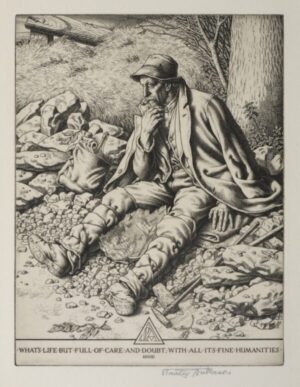Anderson, Stanley (1884-1966)
Anderson, (Alfred Charles) Stanley (1884–1966), printmaker and watercolour painter. For seven years Anderson trained as a professional engraver in his father’s workshop. He was in his mid-twenties when he was awarded a scholarship to study printmaking at the Royal College of Art in London. He made a name for himself during the revival of line engraving as a mode of original graphic expression, when it had become all but obsolete in 1920s Britain. He also taught etching at the Goldsmiths’ College.
By 1941, Anderson was a full member of the Royal Academy of Arts. He initially achieved fame as an etcher and drypointist in the renaissance of British etching during and after World War I. In 1929 he turned his skills to engraving on a copper plate, and he will chiefly be remembered for his engravings of English rural crafts dating from 1932, for which he was made CBE in 1951. Market scenes and street views that recall the Edwardian age. Rural scenes that have turned into sprawling conurbations. And yet, Anderson did not retreat into a romanticised past. He commented on the dramatic changes he observed in British society. To him, those changes were harmful to the human spirit. He saw modernity as a return to ‘barbarism in ethics, childish perversity in the arts and baser ambitions in living.
Showing the single result
